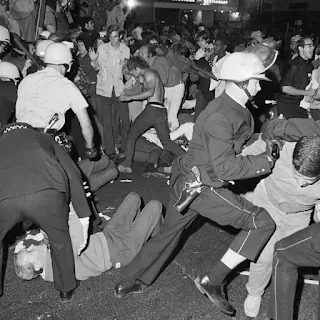As a movie about debutantes and their dates, Whit Stillman’s Metropolitan came into the world in 1990 looking lonely — and now, well, it looks lonelier yet. At the time, the idea of putting the American upper class on film — The Philadelphia Story aside — seemed like a sure way to keep theaters pleasantly uncrowded. Before the movie came out, it was hard to imagine anyone but its subjects wanting to see such a thing, and as for its subjects, did they really exist? America fancied itself a classless society, and old money assisted the illusion by concealing itself and shunning anecdote. Nowadays, you may wonder whether there is anyone left on Park Avenue whose fortune antedates the second Reagan administration. New money is so loud and so insistent that old money has either slipped discreetly away to ancestral hideouts or, as it were, gone native. Metropolitan, which looked like a perverse bit of daring in 1990, today seems like an artifact from an earlier century.
But it’s a lot more than a curiosity. Metropolitan, Stillman’s first movie, is as unexpectedly irresistible as ever: funny, moving, and entertaining, with a wonderful cast of unknowns (who have remained unknown) and quite a number of ideas, served up seamlessly and unassumingly. The story takes place in New York, during Christmas vacation, a hectic time filled with gala soirees. At the center of the composition is a group of friends who call themselves the Sally Fowler Rat Pack, after the one of their number who hosts the postdance skull sessions that supply the setting for much of the picture. As the movie begins, the seven members annex an eighth, a lone wolf named Tom Townsend, to even the gender balance in the face of a “severe escort shortage.” Tom acts as both the story’s catalyst and the audience’s knothole viewpoint.
The Rat Pack is composed of a delicately varied assortment of personalities. Sally Fowler herself (Dylan Hundley), a chipper contralto blonde, turns out to harbor smoldering ambition. Fred Neff (Bryan Leder) is mordantly self-aware, when he isn’t passed out on the couch. Jane Clarke (Allison Rutledge-Parisi) aspires to queen bee status, which makes her come off as older than the rest of the crowd. Cynthia McLean (Isabel Gillies) is sensual and capable of treachery. Charlie Black (Taylor Nichols) is bespectacled and already a walking op-ed column. Audrey Rouget (Carolyn Farina) is sensitive, pure of heart, and a bit dowdy. Nick Smith (Christopher Eigeman), the pack’s real leader, occupies center stage most of the time and is so armored by irony that it takes a while to realize he means everything he says. Tom (Edward Clements) is necessarily the figure who sets himself apart from the crowd, the insecure rebel and proudly hesitant prospective member.
Tom is, in fact, whether he likes it or not, not quite one of them. His parents are divorced, and even though he comes from the right background, he now lives on the infra dig Upper West Side (back when the Upper West Side was infra dig) with his mother, who has no money of her own. Thus he spends a lot of time concealing his deficiencies — that his tuxedo is rented, for example, or that he wears a raincoat because he can’t afford an overcoat. Both idealism and defensiveness propel his jejune political and literary pronouncements — he declares himself a Fourierist, for example, which is to say that he wants to be a partisan of the radically impossible. The story gets rolling when Audrey falls in love with Tom, which prompts him to actively resume his dormant infatuation with the icily distant Serena Slocum (Elizabeth Thompson). The narrative assumes its full shape with the appearance of Rick Von Sloneker (Will Kempe), a fantastically archetypal cad.
Metropolitan is an unashamedly literary film. Tom is unmistakably an offspring of F. Scott Fitzgerald’s sincere young heroes, although the world he enters is more closely knit and fundamentally provincial than Fitzgerald’s haut monde. It is, in fact, a fishbowl out of Jane Austen. (None of these allusions are exactly concealed by the director, who also wrote the script.) Austen is virtually a character in the story, but Stillman manages to avoid its seeming coy when, for example, Tom and Audrey argue about the “immorality” of the young players in Mansfield Park (Tom, characteristically, has not read the book, but relies on Lionel Trilling’s account, since critics spare readers needless toil by supplying the writer’s views as well as their own). The dialogue is ostentatiously written; every character wields subordinate clauses and uses words like however and nevertheless. The combination of stilted speeches and deft behavioral acting sometimes seems peculiar, but it is also peculiarly apposite. Like Austen, Stillman wears his irony lightly and deploys it affectionately.
The look of Metropolitan derives from a very different tradition, in part because the movie was made on a tiny budget that restricted locations and virtually precluded camera movement. Stillman and his resourceful cinematographer, John Thomas, worked out a series of graceful compromises, between stasis and airiness, formal composition and liquid spontaneity. The result is a look, surprisingly apt, that is most reminiscent of the early films of Eric Rohmer; and the disarmingly daffy end sequence has a low-budget, to-hell-with-it rambunctiousness that evokes Jean-Luc Godard’s Band of Outsiders. This may seem odd at first — a picture about the rites of passage of the “urban haute bourgeoisie” might be expected to appear as impeccably composed as The Earrings of Madame de?.?.?. — but shoestring improvisation provides the metaphor for the film’s subtheme.
Urban haute bourgeoisie, or UHB (pronounced uhb), is a term coined by Charlie, who is obsessed with the ongoing failure and imminent doom of his class. Stillman obviously thinks something of the sort himself — the movie’s title is subtle in its archly irrelevant grandeur, but you wonder if Twilight of the Gods didn’t cross his mind. (At one point, Tom’s bedside book is shown to be Oswald Spengler’s The Decline of the West.) Fifteen years on, the picture looks positively prophetic in its choice of villain. The smirking, ponytailed Sloneker may possess a bona fide title, but he is the future of the moneyed class: trashy, smug, narcissistic, abusive, enthroned in his Hamptons beach house. The members of the Sally Fowler Rat Pack, by contrast, are preserved in amber, however temporarily — they are serious young people, most of them apparently virgins.
Charlie, pining hopelessly for an era of civic responsibility and disinterested paternalism, represents an idea of conservatism that has now disappeared altogether; he is the most obvious dinosaur. Tom, who claims to be a socialist, turns out to have more in common with Charlie than not. Audrey, who is guided through life by literary classics, has no more of a sense of class entitlement than Tom does. Nick, just as game to fight a duel as to participate in a déclassé, nationally televised ball featuring debs from the hinterlands and their military escorts, is a romantic fatalist who would be at home everywhere and nowhere. Sally is fully endowed with poise and decorativeness, but she wants to be a pop star. Jane, who will probably be the first to get married, may also be the first to go on television. Cynthia has such a deeply rooted sense of privilege that she seems fated to end up in a Page Six scandal. Each of them is attempting to juggle two sets of values. At one point near the end, Tom and Fred are in a bar with Charlie, who has just finally delivered the eschatological sermon on class that has been building up in him. They spot a guy in his late thirties, and Charlie appeals to him for confirmation of his ideas. The graybeard doesn’t laugh or walk away but says, in effect, just get on with things. The point is clear, if unspectacular: realism and compromise are necessary if you want to stay alive.
This may sound dully practical, but the story’s unforced symmetry and the characters’ very credible complexities fill it out beautifully, and the movie’s plasticity makes it even seem adventurous. Form really does follow function in this film: its classicism is appropriate to the past of its imperiled class, while its ad-lib New Wave verve provides the equipment for facing the future. No less than any of the 1959 breakthrough works of the Cahiers du cinéma crowd, Metropolitan is a triumph of slap-up improvisation over limited resources, and it tells a tale that echoes that of its own construction: it is about making do. As such, it is as much a timeless story about the perils of growing up as it is an account of historically specific change and imbalance. The movie certainly does not concern itself with political questions — the actual money and power that lie behind the cultural anxiety and ritualistic tinsel of the upper bourgeoisie go unmentioned — but it is, after all, a movie about kids. It has remained remarkably fresh, and the elegantly choreographed tension of its many sets of oppositions suggests that it will appear no less fresh when its cultural specifics require footnotes. It is, like any product of good breeding should be, both well rooted and well aired.
Lucy Sante’s books include Low Life, Evidence, Kill All Your Darlings, The Other Paris, and Maybe the People Would Be the Times. Her latest, I Heard Her Call My Name, will be published in February 2024.
Criterion Collection
Luc Sante
Metropolitan
Whit Stillman
Film Reviews













